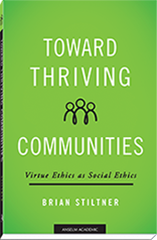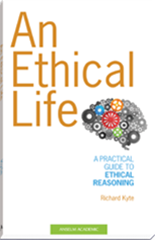Toward Thriving Communities
Virtue Ethics as Social Ethics
About This Book
Overview
What is the relationship between personal virtue and the common good? Toward Thriving Communities: Virtue Ethics as Social Ethics demonstrates how developing individual virtue can lead to a vision for collaboratively improving the wider world. With chapter overviews and summaries, review questions, integrated case studies, definitions, and suggestions for further reading, this text provides a thorough and accessible case for the inseparable pursuits of both personal and societal flourishing.
Details
| Weight | 1 lbs |
|---|---|
| Dimensions | 6 × 1.5 × 9 in |
| Format | Softcover |
| Print ISBN | 978-1-59982-689-9 |
| Pages | 292 |
| Item # | 7073 |
|---|
Customer Reviews
“Brian Stiltner’s Toward Thriving Communities extends virtue ethics to concrete moral situations we face every day. Integrating theoretical analysis with application, Stiltner illuminates the importance of virtue ethics: from parenting to politics, from being a good neighbor to being a conscientious global citizen. Stiltner prompts readers to reflect personally on the moral character they should strive to embody and also to inculcate in the next generation. Going beyond the narrow confines of many introductory ethics texts, Stiltner’s grounded elucidation of virtue theory will prove useful for students and lay readers who haven’t yet been introduced to this classical and time-honored approach to moral living.”
“Eschewing hyperbolic lamentations over the challenges posed for the cultivation of virtue by deep pluralism and rampant materialism, Toward Thriving Communities, by Brian Stiltner, patiently attends to the ordinary communal contexts within which virtuous character is shaped and tested. In accessible, uncluttered prose, peppered with examples from daily life, Stiltner unpacks the interdependent character of personal and communal flourishing. Social contexts such as family, schools, workplaces, and volunteer organizations, he shows, have the potential either to help or to hinder the development of lives worth living, lives of virtuous activity directed toward the common good.”
“In Toward Thriving Communities, Brian Stiltner provides us with a splendid text that teaches us the viability of virtue in social contexts. This timely contribution captures the best that ethics offers us today: a character and growth formation ethics that can be cultivated in families, schools, work, and community service. In these fundamental settings, we can become virtuous, and Stiltner offers us concrete ways to see how this can happen. The book is a welcome dream for any teacher wanting to convey a living, social ethics.”
Table of Contents
Contents
Part 1—Virtue Ethics as Personal, Communal, and Social Ethics
Chapter 1. Approaches to Ethics
Chapter 2. Virtues: Norms for Acting and Living
Chapter 3. Human Flourishing: The Purpose of Life, the Purpose of Ethics
Chapter 4. Communities: The Contexts for Becoming Good and Living Well
Part 2—The Pursuit of Flourishing in Social Contexts
Chapter 5. Families: First Teachers and Promoters of the Common Good
Chapter 6. Schools: Education for the Good Society
Chapter 7. Work: Meaning on the Job, Responsibility in the Economy
Chapter 8. Service: Groups That Promote Charity, Justice, and Purpose
Professional Reviews
Horizons, The Journal of the College Theology Society – December 2017
KATHERINE A. GREINER, Carroll College
Toward Thriving Communities: Virtue Ethics as Social Ethics. By Brian Stiltner.
Winona, MN: Anselm Academic, 2016. 292 pages. $28.95 (paper).
How do we in American society define the good life? How do we understand and promote authentic human flourishing in our personal lives and in our communities? What do virtue ethics have to do with social ethics, and how can they be practiced in meaningful ways in our communities? What virtues do we value, and how do we cultivate them at the personal, communal, and social levels? Brian Stiltner addresses these key questions in his introductory book, Toward Thriving Communities: Virtue Ethics as Social Ethics. Clear, accessible, and well researched, Toward Thriving Communities is a valuable resource for teachers and students of virtue and social ethics.
Toward Thriving Communities is divided into two parts. After a general overview of the study of ethics, Stiltner shows how virtue ethics can be used to frame the pursuit of the good life and human flourishing at the personal, communal, and social levels. Stiltner argues that the teleological vision to which virtue ethics subscribes, as first set forth by Aristotle, adopted for Christianity by Aquinas, and continuously developed and applied today by contemporary philosophers such as Alasdair MacIntyre and Julia Annas and Christian ethicists such as James Keenan and Julie Hanlon Rubio, can and should guide contemporary American society—in all its complexity and diversity—toward a greater commitment to the common good.
In the second part of the book Stiltner applies his argument to four communities that are common building blocks of contemporary American society: families, schools, workplaces, and service organizations. Stiltner describes how each of these communities helps develop the moral character of its members and contributes to the overall good of society. He argues that the health of contemporary American society depends on how empowered these communities are to live out and cultivate virtues such as justice, love, courage, and prudence at the personal and communal levels. In each of these four chapters Stiltner provides a different case study that shows how virtue ethics can be practiced to benefit each of the communities. For example, in the chapter “Family: First Teachers and Promoters of the Common Good” Stiltner describes the Jenkins family, a typical middle-class family in the suburbs of Chicago. Stiltner uses this case study to demonstrate how families help develop the moral character of each of their members and to examine the internal and external challenges families face today that prevent them from thriving.
This example illustrates the book’s greatest strength: its pedagogical method. Stiltner skillfully guides the reader through the thicket of ethical questions and challenges communities face today in a way that is accessible and practical—not intimidating or pedantic. He does so by weaving together scholarship in sociology, theology, and philosophy with a plethora of relatable narratives and case studies. Stiltner wrestles with thorny political issues such as economic discrepancies between races and classes, public versus private education, and health-care accessibility in the United States in balanced and reasonable terms. He models how thoughtful reflection on questions regarding the good life, human flourishing, and the common good must rise above the unhelpful confines of “conservative” or “liberal” agendas that tend to derail public debate. Stiltner’s presentation of issues is designed to spark lively discussions informed by thoughtful and well-reasoned analysis. This balanced approach will prove valuable in undergraduate classrooms today.
The format and structure of the book are also pedagogically useful. Each chapter opens with clear learning objectives and ends with comprehension subject to the Cambridge questions, discussion questions and activities, and suggested reading lists. These resources will prove to be particularly helpful for instruction.
One minor shortfall of the book is its lack of an integrative conclusion that ties together Stiltner’s application of virtue ethics to family life, schools, the workplace, and service organizations. Explicitly showing how these four communities are interconnected would strengthen the book’s central argument that these communities play a vital role in promoting human flourishing in society.
That said, Toward Thriving Communities provides an excellent introduction to virtue ethics and its implications for people committed to cultivating flourishing communities that promote the common good in society. Toward Thriving Communities should be on the bookshelf and the syllabus of any professor in need of an accessible, academically rigorous, and relevant introduction to virtue ethics and social ethics, particularly at the undergraduate level.






